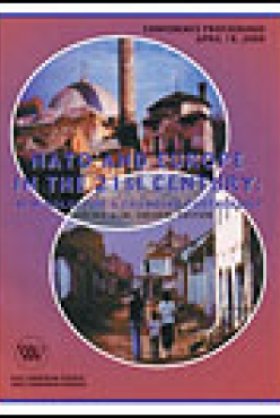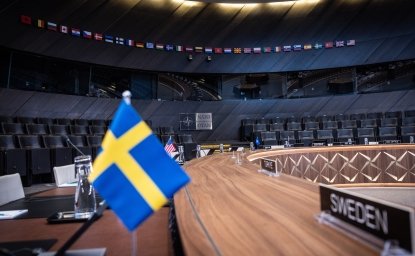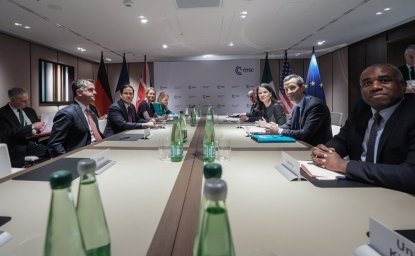"NATO and Europe in the 21st Century: New Roles for a Changing Partnership"


The Wilson Center's East European Studies and West European Studies programs organized this day-long conference on April 19, 2000.
The conference conducted a comprehensive examination of the NATO-Europe partnership and its future prospects, as well as an analysis of the implications of the Bosnian and Kosovo wars for NATO and for the new and aspiring members of the NATO alliance and the European Union (EU). The goal of the conference was to provide a comprehensive view of the West's key integrative institutions, NATO and the EU, as well as a clear summary of the evolving security picture in Europe and of America's future role in an ever-evolving NATO.
From the Conference Proceedings, there is a clear sense that the way in which critical institutional and procedural questions are answered in the context of Kosovo and Southeast Europe will in large measure determine how the members of NATO respond, and if they are prepared to respond at all, to similar crises and challenges in the future. NATO may have a new Strategic Concept, but its readiness to take on future peace-keeping and peace enforcement responsibilities will be largely determined by the experience in Bosnia and Kosovo.
CONTENTS
PREFACE (PDF 159KB)
Martin Sletzinger, Director of the East European Studies program, Woodrow Wilson Center, and former congressional staff consultant; and Samuel Wells, Associate Director, Woodrow Wilson Center and Founder, International Security Studies Program
INTRODUCTION - AN EXPANDED ALLIANCE VIS A VIS THE EUROPEAN UNION: A STOCK-TAKING ON THE DAWN OF A NEW CENTURY (PDF 97KB)
Ambassador Robert Hunter, Senior Advisor, RAND Corporation, Washington, DC, Former Ambassador to NATO, and Principal architect of "New NATO" security framework
THE EUROPEAN UNION AND THE EUROPEAN SECURITY AND DEFENSE INITIATIVE (PDF 229KB)
Martin Walker, Independent author and contributing editor, Los Angeles Times and European Magazine, Public Policy Fellow, Woodrow Wilson Center
POLITICAL ECONOMY OF THE NEW EUROPE: EU EASTERN ENLARGEMENT (PDF 211KB)
Bartlomiej Kaminski, Associate Professor, Department of International Political Economy, University of Maryland, College Park and Consultant, Development Economics Research Group, World Bank, Washington D.C.
THE KOSOVO CONFLICT AND THE CENTRAL EUROPEAN MEMBERS OF NATO: LESSONS AND IMPLICATIONS (PDF 203KB)
F. Stephen Larrabee, Senior Analyst, RAND Corporation, Washington, D.C. and Former Vice President and Director of Studies, Institute for East-West Security Studies, New York
THE NEW ALLIES: APPROACHING NATO POLITICAL AND MILITARY STANDARDS (PDF 283KB)
Marybeth Peterson Ulrich, Associate Professor, Government and Politics at Department of National Security and Strategy, U.S. Army War College
KEYNOTE ADDRESS - NATO AND KOSOVO: LESSONS LEARNED AND PROSPECTS FOR STABILITY IN SOUTHEASTERN EUROPE (PDF 161KB)
Stephen J. Flanagan, Director, Institute for National Strategic Studies, National Defense University and Former Special Assistant to President and Senior Director for Central and Eastern Europe, National Security Council
PROSPECTS FOR SECURITY AND STABILITY IN FORMER YUGOSLAVIA: A BRITISH PERSPECTIVE (PDF 202KB)
Misha Glenny, Journalist and author, Great
Britain
THE UNITED STATES AND THE FORMER YUGOSLAVIA: IS THERE SCOPE FOR CONSENSUS? (PDF 213KB)
Ivo Daalder, Senior Fellow, Foreign Policy Studies, Brookings Institute, Washington D.C.
THE BALKANS AND BEYOND: THE EUROPEAN PERSPECTIVE ON FUTURE REGIONAL STABILITY (PDF 118KB)
Sophia Clement, Member of the Directorate, Delegation for Strategic Affairs, French Ministry of Defense
SPEAKER BIOGRAPHIES (PDF 62KB)
CONFERENCE PARTICIPANTS (PDF 30KB)
CONFERENCE AGENDA (PDF 36KB)
Author

Global Europe Program
The Global Europe Program is focused on Europe’s capabilities, and how it engages on critical global issues. We investigate European approaches to critical global issues. We examine Europe’s relations with Russia and Eurasia, China and the Indo-Pacific, the Middle East and Africa. Our initiatives include “Ukraine in Europe”—an examination of what it will take to make Ukraine’s European future a reality. But we also examine the role of NATO, the European Union and the OSCE, Europe’s energy security, transatlantic trade disputes, and challenges to democracy. The Global Europe Program’s staff, scholars-in-residence, and Global Fellows participate in seminars, policy study groups, and international conferences to provide analytical recommendations to policy makers and the media. Read more

Explore More
Browse Insights & Analysis
Trump Speaks with Putin in Effort to End Russia-Ukraine War

From Partner to Ally: Sweden’s First Year in NATO

“Security, Europe!”: Poland's Rise as NATO's Defense Spending Leader
